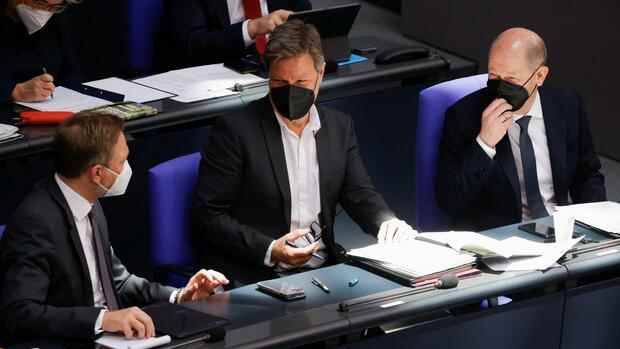According to the federal government, consumers and companies should be relieved – but in what way is still controversial.
(Photo: Reuters)
Berlin The traffic light government has been struggling for a week. In a hastily convened coalition committee, they finally want to tie down the second relief package on Wednesday evening. A working group of the governing coalition of SPD, Greens and FDP has agreed on a broad basis for a second energy cost relief package.
Although it has been agreed not to disclose the content, the Handelsblatt has a twelve-page document classified as “confidential” with the current status of negotiations. However, according to this draft, many points are still disputed.
The traffic light wants to relieve employees by introducing a flat-rate energy price due to the high energy prices. According to the paper, there should be a one-off bonus “to cushion particular hardship for families as soon as possible” in addition to child benefit. Likewise, social welfare recipients should receive a one-off surcharge and pensioners a one-off energy price lump sum.
The proposal also contains the idea of Federal Finance Minister Christian Lindner (FDP) to introduce a time-limited fuel discount. The SPD, Greens and economists have so far strictly rejected the proposal. Instead, the Greens are pushing for energy money as a per capita payment. The proposal for a temporary mobility allowance of up to 50 euros a month, graded according to income, had become known from the Ministry of Labor of SPD Vice Hubertus Heil.
Top jobs of the day
Find the best jobs now and
be notified by email.
The traffic light also envisages lowering the energy tax on fuel to the European minimum. Also being discussed is a one-off discount on vehicle tax and converting the heating subsidy into a permanent flat-rate heating fee based on household size from 2023.
“Super depreciation” should come in 2023
The FDP is also pushing for further relief. According to the paper, the so-called cold progression should be fully compensated for in 2023. The cold progression creates creeping additional burdens for taxpayers in the event of salary increases. Because of the higher tax rate then due, they pay higher taxes, but because of the strong price increases, they hardly have any more money in their pockets.
The “super depreciation” demanded by Lindner should come at the beginning of 2023. There had recently been a discussion about when the best time would be for such simplifications for companies.
The package should also contain “determined measures to strengthen our energy independence”. The traffic light wants to strengthen both domestic natural gas production and the procurement of liquid gas in order to become less dependent on gas from Russia. Hydrogen should also be used more as an energy source and “international supply partnerships should be promoted” for this purpose, the paper says.
The traffic light wants to reduce gas consumption in power generation “by keeping the coal-fired power plants on standby if possible,” the traffic light coalition partners continue. In this context, the decommissioning of coal-fired power plants could “be suspended until further notice”. The traffic light, on the other hand, still rules out sticking to nuclear energy.
The coalition leaders are to decide on Wednesday evening what will ultimately be implemented by these measures. This will not be easy, as the comments by the Federal Ministry of Labor in the paper show. Many of the planned measures do not take effect immediately, can only be implemented next year or are environmentally harmful and thus actually torpedo the traffic light plans for the energy transition.
Just over a month ago, immediately before the outbreak of the Ukraine war, the traffic light government had already launched an initial relief package with a volume of around 15 billion euros to relieve citizens and companies from the high energy prices. After the Russian invasion, oil and gas prices repeatedly reached new record highs.
At the same time, the war is heating up delivery bottlenecks and thus the already high inflation. The Ifo Institute now anticipates inflation of 6.1 percent for this year.
Lindner wants to comply with the debt brake from 2023
The traffic light therefore considers a second relief package to be necessary. The federal government wants to finance all the measures through higher debt. Finance Minister Lindner is planning a supplementary budget for this year, in which the measures taken because of the Ukraine war are to be bundled. This will significantly increase the previously planned new debt of almost 100 billion euros.
Higher debts are not a problem this year because the exceptional rule of the debt brake, which allows higher debts, still applies due to the corona crisis. From 2023, Lindner wants to comply with the debt brake again. To do this, the liberal must then reduce the new debt in one fell swoop from well over 100 billion euros to 7.5 billion euros.
More: Aid for the economy, no tax increases – Lindner seeks approval for record debt budget
